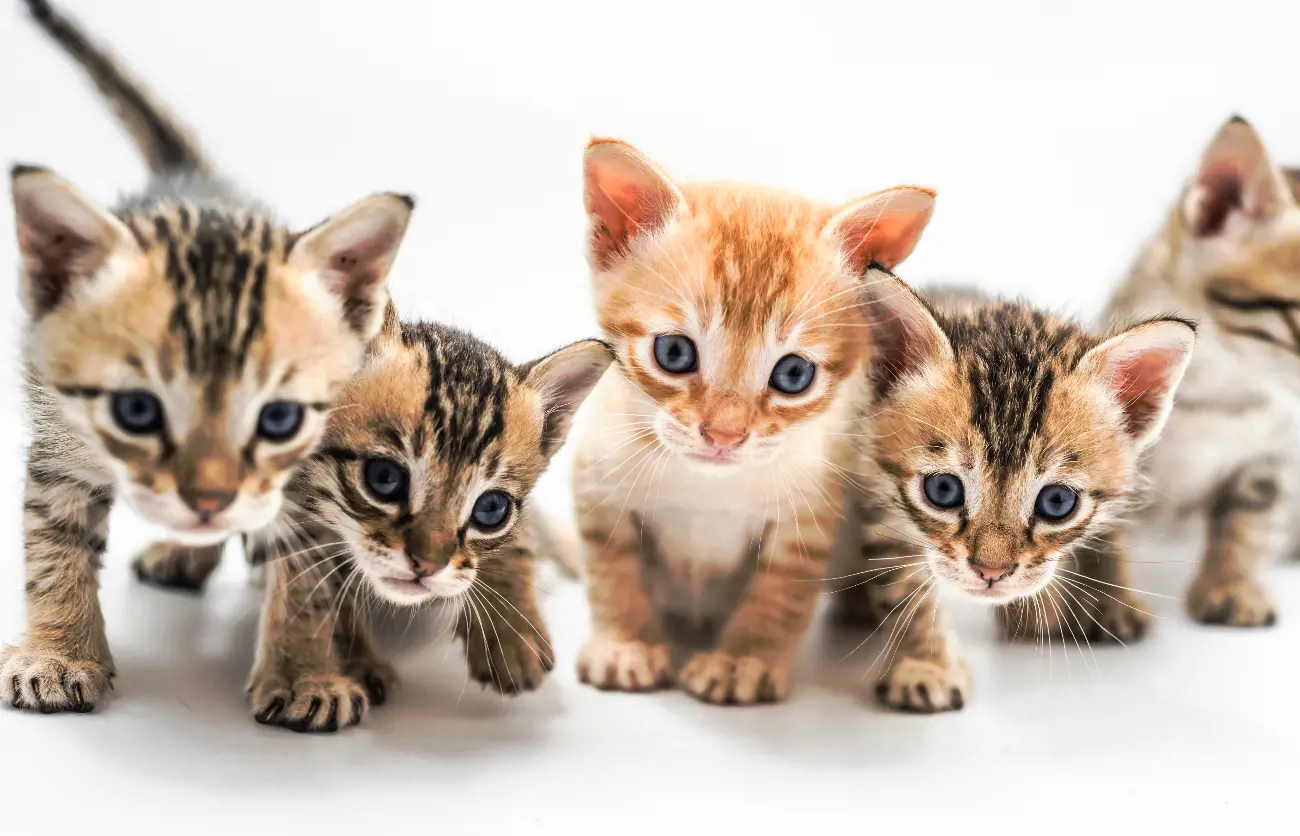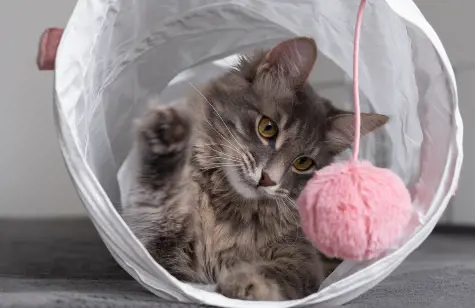How can I stop my neighbour feeding my cat?
28th January, 2021
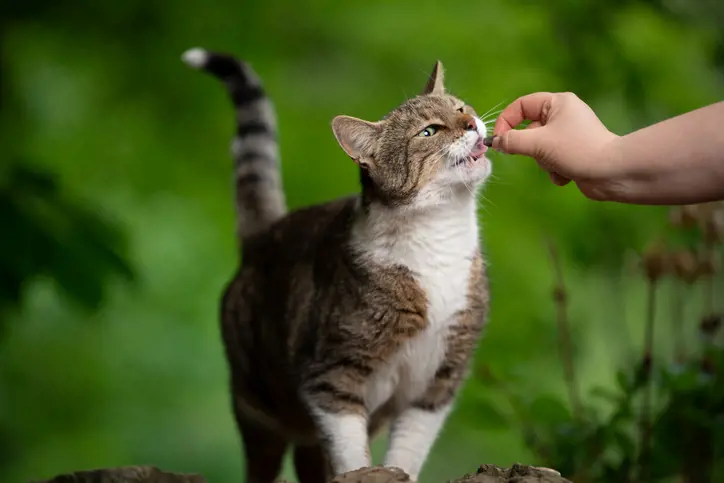
What should you do if you suspect a neighbour is feeding your cat? As a pet owner, you have a responsibility to make sure your pet has the right diet. If a neighbour feeds your cat, you are no longer fully in control and the consequences could see you having to claim on your cat insurance for medication or treatment.
Let’s look at how you can stop a neighbour from feeding your cat.
Why would you feed someone else’s cat?
People feed cats because they love cats, and often do not realise that their actions could cause the cat harm. Cats are very good at pestering for food.
If someone sees a cat in their garden who seems hungry, they might think it was a stray cat and give it food out of concern.
On the other hand, a neighbour might know that a cat has a happy home, but not stop to think whether giving extra food is a good idea.
If you love cats, you will probably get pleasure from seeing one eat happily and may get a purr or a snuggle as your reward. Many people might not realise that eating too much can damage a cat’s health.
The consequences of overfeeding a cat
In the UK, more than one in three cats are overweight or obese. Extra weight comes with higher risk of health conditions such as heart problems, diabetes, cystitis, arthritis, liver disease, breathing problems and cancer, all of which can reduce a cat’s lifespan as well as causing pain and discomfort.
If you have insurance for your cat already, these conditions should be treated under your cover. If your pet is uninsured, it’s a good idea to get cover before a new health condition develops as it can make insurance more expensive, or even impossible, to find.
Even a small imbalance in your cat’s diet can, over time, lead to a life-threatening weight problem. A few extra treats here and there add up over time, eventually making your puss podgy.
In no time, a cat can go from fit to fat. As you see your cat every day, you may not even notice the gradual change.
When a cat is a healthy weight, you should be able to feel their spine, ribs and hip bones easily and their tummy should be held in, rather than bulging out.
A healthy cat has a sleek profile, with a body that goes in and out gracefully around the neck, shoulders, belly and hips. When a cat is overweight or obese, fat pads out these natural curves, leaving the cat with a much more rounded appearance and squashier feel.
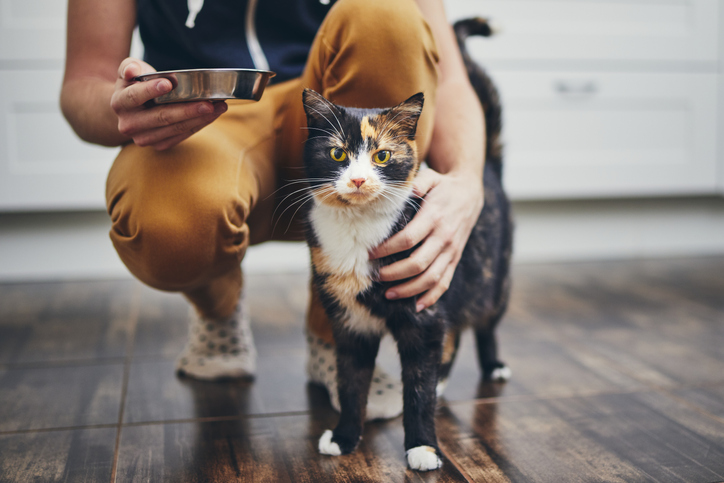
Feeding a cat the wrong foods
If a neighbour takes to feeding your cat unsuitable foods, there could be problems beyond weight gain. For example, feeding a cat raw meat could expose them to diseases and toxoplasmosis, which has serious consequences for humans, particularly during pregnancy.
If your cat usually has a special diet to control a health problem, a neighbour could be giving food that could aggravate the problem.
Cats are independent creatures, and food is one of the main reasons they have for coming home every day. If a cat is fed elsewhere, they could eventually stop coming home altogether, either becoming a stray or moving in with a new family.
This is obviously an upsetting situation and one you will want to do all you can to avoid.
How can you tell if a neighbour is feeding your cat?
There are a number of telltale signs that your cat is supping with the neighbours. Firstly, you might notice that your cat is putting on weight.
If you’re sure that the food you provide is the right amount but they continue to get fatter, this could be a sure sign that someone else is providing some nibbles.
You should also watch out for your cat hanging around the door of a neighbouring house, especially if they are meowing for food. Cats know how to communicate their desires and once they have been fed by a neighbour, they will likely go back and ask for more.
You could also watch out for your cat’s eating patterns changing. For example, it might start to eat at different times or eat less of the food you provide, without losing weight.
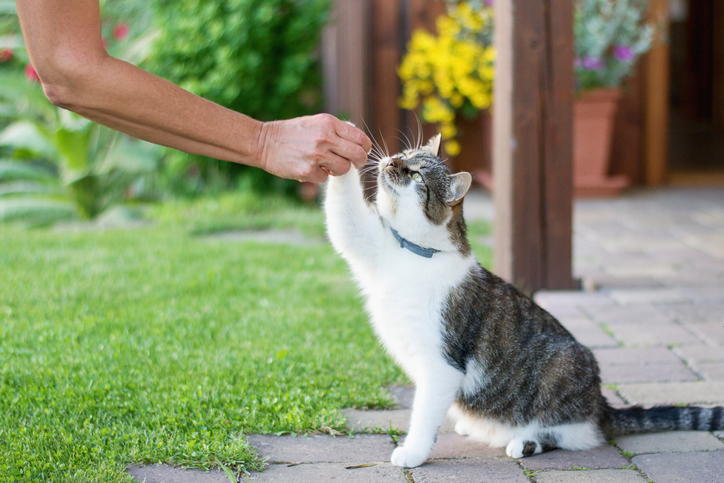
What should you do about a neighbour feeding your cat?
If you suspect a neighbour is feeding your cat, it’s best to try to resolve the situation calmly. Resorting to accusations and anger is never the best answer – remember, you could be living alongside your neighbours for a long time!
Talk about the issue
Your neighbours might not have worked out that the hungry cat who visits them is actually your much-loved pet. Often, people mistake a pet for a stray who is in genuine need of food – gently put them straight if this is the case.
If you don’t know your neighbours, knock on the door and introduce yourself, show a picture of your cat and say your pet has a habit of nagging for food, but should not be fed as he or she gets plenty of food at home and does not really need any treats or top-ups elsewhere.
It’s best to avoid a confrontational style – at least to begin with, don’t ask your neighbours if they have been feeding your cat as it could be taken the wrong way and cause tension. Resolving the situation without falling out is always the best option.
Make some posters
If you’re not quite sure which of your neighbours could be feeding your cat – or even if you think more than one neighbour is doing it – then posters could help. Make up some posters and put them up in your local area, on lampposts, noticeboards and similar, to say that your cat is not a stray and has enough to eat at home.
You can also post messages on local Facebook lost and found groups or similar. It’s possible that someone thinks your cat is lost and in need of food.
Do all you can to tell people that your cat is much loved and should not be fed by anyone else. Also include information about any food allergies or intolerances your cat may have to warn people that giving them the wrong food could be deadly.
Use a paper collar
You can dupe your pet into being an unwitting messenger by attaching a paper collar. Print a collar saying ‘do not feed me!’ or even buy your pet a permanent collar or tag saying the same.
You could add a sentence saying that the cat has a caring owner and does not need additional food.
This is a really good option if you suspect someone is feeding your cat, but you’re not sure who.
You can also put ‘on a special diet’ on the collar to add extra weight – people will be much less likely to feed a cat if they think it could make the animal ill.
Use a GPS tracker system
If you’re not sure where your cat is dining out, you can do a little super sleuthing by investing in a GPS tracker. You attach the tracker to your cat’s collar and it feeds back data about where your cat has been.
If you see your cat lingering around one house in particular, you will probably have found the address of the new neighbourhood kitty restaurant.
The GPS information can prove useful if your neighbour says they have not been feeding your cat – hard evidence showing your cat going back to an address over and over again usually clears up any doubt.
Escalating the issue
If a gentle chat or a few posters do not do the trick, you might need to take a sterner tone. If you know who has been feeding your cat, you could try writing a letter with a more formal request to stop giving your pet food.
Again, you want to avoid falling out with your neighbours so you could start out by saying you know the neighbours do not mean any harm, then explain the consequences of overeating for your cat’s health and the cost of vet care for any associated problems, followed by a polite request to stop giving any food.
Taking legal action
Legal action is unlikely to prove successful and you should think very carefully before going down this route. The police usually see issues involving pets as civil matters and do not wish to be involved.
In the eyes of the law, a cat is an item of property that can be harmed or stolen in the same way as any other item of property.
You could seek to take a neighbour to court to claim back additional vet costs if it could be shown these were caused by the neighbour feeding your cat, or if the neighbour was keeping your cat at their property for long periods.
However, the cost of making a court claim or using a lawyer is considerable. No matter how much you love your pet, spending a fortune to stop your neighbour feeding your cat is unlikely to be a smart move.
On the other hand, a letter from a solicitor threatening legal action could be what it takes to make a neighbour take you seriously after gentler approaches to the problem have failed. Just be careful not to spend more money than you can afford on legal fees.
You could talk to your cat insurance provider provider about whether they are able to help, for example through cover for lost or stolen pets.
Keeping your cat at home
If all else fails, you could consider keeping your cat behind closed doors as a house cat, rather than letting him or her roam freely.
Many cats are perfectly happy to live this way, so long as they get plenty of play and stimulation through using toys, playing with you, and having apparatus to climb and explore. You may even find your kitty insurance provider offers a discount for a house cat.
This option might seem a bit drastic but it will ensure that you have complete control over what your cat eats. If your puss has a serious medical condition or allergy that means being fed the wrong food could cause serious injury or death, keeping your cat at home could be the best option.
Moving home
It’s a big upheaval to move to a new house, with plenty of inconvenience and cost involved. However, if you feel your pet’s health is under threat in your current location and you’ve already had a big argument with your neighbour about feeding your cat, then it might be time to move on to pastures new.
Don’t forget to update your address details with your cat insurance provider!
How to slim down an overweight cat
Once you’re sure you are the only one feeding your cat, it’s time to address the extra weight your pet gained by double-dining with the neighbours. Your vet will be able to give you advice on how you can reduce your pet’s diet and return them to health.
Firstly, you need to be clear about how much your pet should be eating. The recommended amounts on pet food packaging are sometimes over-generous, so ask your vet what you should provide and how you should balance wet and dry food.
Cats’ needs change throughout their lives, so a kitten will need a different diet to an older adult feline. Make sure you know how to provide balanced nutrition for your pet’s current life stage.
Treats are one of the main ways that cats consume excess calories. Treats should account for only a small proportion of your cat’s diet, and you should avoid giving your cat raw meat, milk or food scraps.
If you are reducing the amount of food you provide, you may find it helps to offer food in multiple servings throughout the day, rather than a single feeding time. Use a measuring device or scoop to make sure you give the right amount, and always give fresh water along with the food.
Keeping your cat active is another part of the solution. Play helps your cat burn calories, improve their health, connect with you and avoids your pet eating through boredom.
You could try offering food in a puzzle toy, making your puss spend time and energy to get their food rather than it being heaped in a bowl.
Do you have the right insurance for your cat to protect your pet? Get a quote from Purely Pets today.
Policy benefits, features and discounts offered may very between insurance schemes or cover selected and are subject to underwriting criteria. Information contained within this article is accurate at the time of publishing but may be subject to change.
Helpful Pages
Recent Posts
Pet Insurance Quote
- 98% claims paid *
- Claims paid directly to vets
- 24/7 vet video consultations
- Interest free monthly payments
